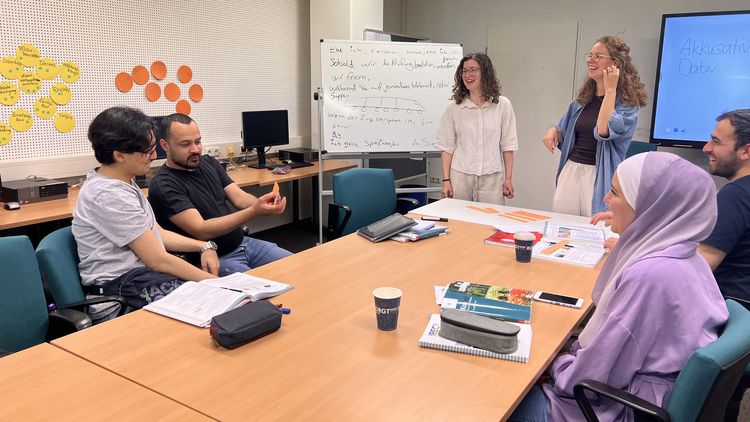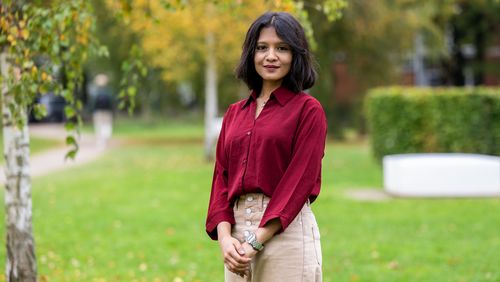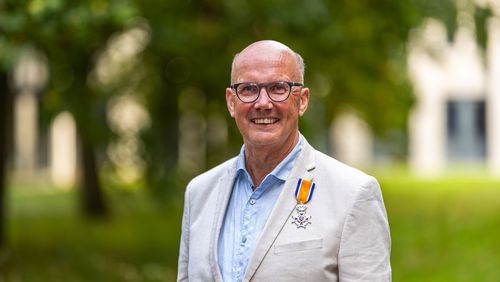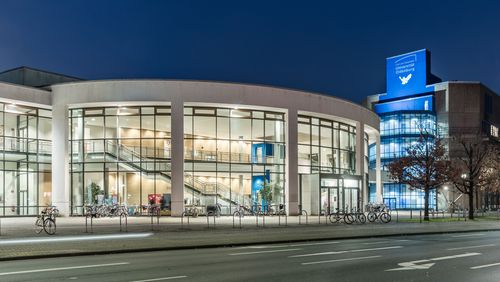Learning German as a foreign language is a challenge. The ‘DeutschPlus’ tutorial programme supports international students, as well as children and young people, in their language acquisition – in a playful, practical way and accompanied by dedicated tutors from the student body.
Anyone who learns a new language knows that it takes diligence and perseverance to master vocabulary, grammar and language skills. Ukrainian Oleksii Osheka can speak from personal experience: "The hardest thing for me was learning the correct articles for each word. In my native language, Ukrainian, the gender of a word is determined by its ending. There are no articles." Despite this challenge, he now speaks German at level C1, which is a prerequisite for studying at the University of Oldenburg. He owes his success to the regular language course at the university's Language Centre and the supplementary tutorial. ‘I had great tutors whose support helped me improve my language skills,’ reports Oleksii. The tutorials are offered by the Language Centre and take place weekly for ninety minutes. They are open to all international students who are attending a preparatory German course at the university. The aim is to practise writing, speaking and listening. Participants are supported and guided by student language assistants. They teach German through language learning games, vocabulary training and exercises, all of which are coordinated with the lecturers of the corresponding German course and adapted to the current lessons of the German course. In addition, a relaxed exchange among each other is at the forefront, for example about everyday life at university or city life.
Oleksii Osheka attaches great importance to the German tutorial, at least as much as to the language course itself. For him, the course was a complete success: today, he himself leads a tutorial at B1 level. ‘Although it only takes place once a week, you can significantly improve your German skills during these lessons. At least that was the case for me,’ says Oleksii. He highlights the smaller group size and learning without exam pressure as the reasons for this. ‘Learning is playful – that helped me to internalise the language better.’ He particularly liked the close contact within the group: ‘It gave me the confidence to talk openly about my challenges, such as which words are appropriate in a conversation.’ His positive experiences ultimately led him to decide to train as a tutor himself. ‘It was a spontaneous decision that I don't regret,’ he reports. At first, he had doubts about whether he was even suitable as a tutor, as his German is not yet perfect. ‘However, I realised that I am very capable of passing on my knowledge and putting myself in the learners' shoes. It's a lot of fun.’ Alex Straub and Paula Messer, both teacher training students, also wouldn't want to miss out on their time as tutors. "I found it particularly exciting to find out what difficulties can arise when learning German. For example, that many who don't dare to speak already understand a lot,‘ says Alex. Paula adds: ’To teach someone a language, you need patient, empathetic and open-minded people who support you. That's exactly what I wanted to convey." The two are certain that they will benefit from the experience later in their professional lives. ‘Through “DeutschPlus”, I have learned methods that I can use in everyday school life,’ reports Alex, who is studying English and economics to become a vocational school teacher. Paula, who is currently studying philosophy and art to become a teacher, has realised through her experience as a tutor: ‘I want to continue working with international students in the future.’ She will do her master's degree in ‘German as a Foreign Language’.
Anyone who wants to train as a tutor must take part in a two-week intensive workshop, which takes place before the start of each semester in March or September. There, students learn how to teach German as a foreign language and which teaching methods are helpful. Dealing with potential intercultural challenges is also on the agenda. In addition, participants sit in on language courses at the Language Centre and prepare their first lesson, which they teach at the end of the workshop. ‘The latter reduces anxiety, and students realise that they too have what it takes to teach,’ says Ellen von Hagen. She leads the intensive workshops and teaches German as a foreign language to international students at the Language Centre. ‘For me, “DeutschPlus” is a labour of love. I receive a lot of gratitude from the students because the tutorial helps them make further progress in language acquisition,’ she enthuses. In addition, the tutorial creates a connection between local and international students, which often leads to close friendships. After the intensive workshop, students have two options: they can either offer language support in the form of the tutorials described at the university or as language support in schools. A tutorial runs for one semester. The duration of the assignment at a school can be freely chosen according to need. "Schools in particular are reporting a high demand for support, as there are immigrant children and young people in all grades who speak little or no German. We help students find a suitable school,‘ emphasises von Hagen. Upon successful completion, students receive a volunteer certificate that they can use to prove their commitment to schools. ’The qualification as a language assistant is open to everyone, regardless of their field of study. Anyone who would like to gain experience before their teaching internship is also welcome," says von Hagen.




